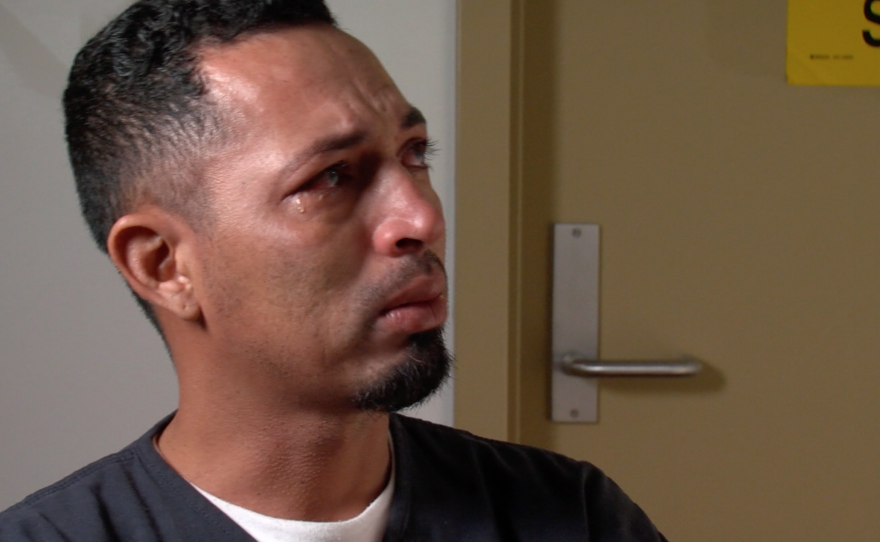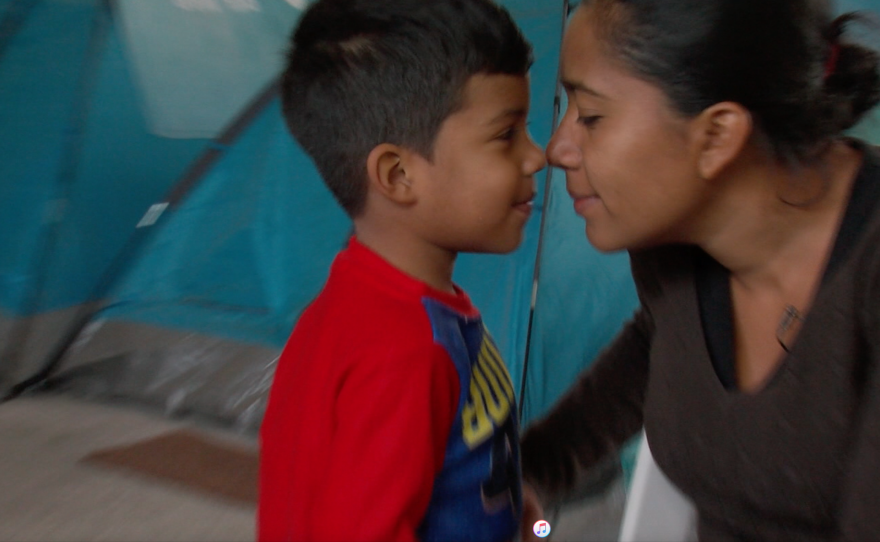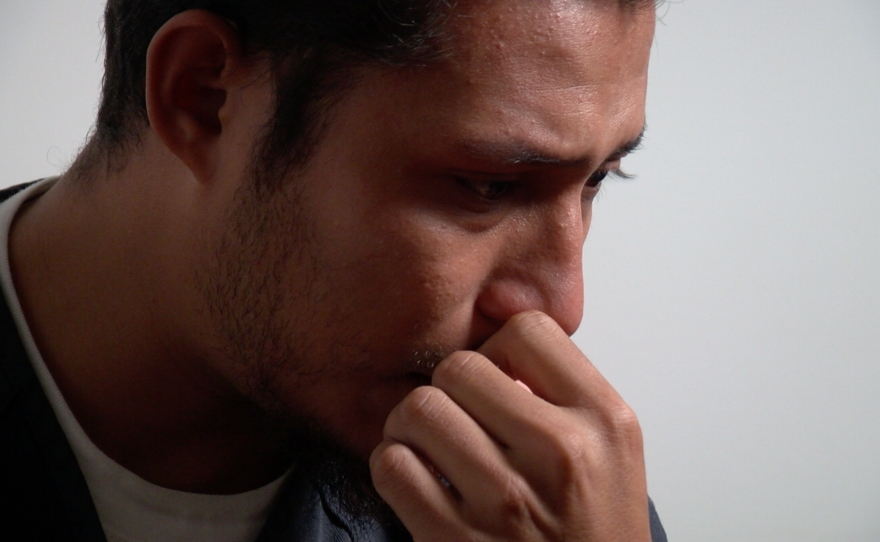Jose Demar Fuentes, 30, broke into sobs when asked to describe his 1-year-old son, Mateo.
"Mateo," Fuentes began, losing his composure as soon as he spoke the name. He wiped the tears from his cheeks, took a deep breath and continued: "We've always been so united.”
Nearly the entire length of the U.S.-Mexico border separates him from his child, whom he brought all the way from El Salvador. Fuentes said they were fleeing gang violence and extortion, only to be separated by immigration officials.
“What I would give to have my son close to me,” he said.
Fuentes wore a navy blue uniform and a name tag identifying him as an inmate of the private prison company CoreCivic. He was in the custody of Immigration and Customs Enforcement, or ICE, at CoreCivic’s Otay Mesa detention facility, awaiting an asylum hearing. His son was in Los Fresnos, Texas with the Office of Refugee Resettlement.
A spokeswoman for ICE said the agency separated the pair on Nov. 16 because Fuentes could not provide documentary proof that he was the father of the child after they arrived at the San Ysidro Port of Entry.
"Historically, some criminal smuggling organizations have paired non-relative children and adults with each other to minimize the chance of being detained ... for the safety of the children involved, ICE must require documentation of these family relationships," the agency said in an emailed statement.
Fuentes said he gave officials with Customs and Border Protection, or CBP, his son’s birth certificate and his Salvadoran ID on Nov. 12, and that they returned the latter document for his subsequent meeting with ICE, while telling him that the birth certificate had to remain in a separate file.
KPBS obtained copies of those said documents from Pueblo Sin Fronteras, an immigrant rights organization that helped Fuentes make the dangerous trek through Mexico in a caravan of asylum seekers. The family had scanned the documents before the crossing. CBP declined to confirm whether it had ever received those documents from Fuentes. ICE said it did not receive a passport or birth certificate but that it is working with El Salvador’s consulate to verify the familial relationship.

The Other Fathers
Three other Central American men — one from Honduras, two from El Salvador — said they were in the room with Fuentes when Mateo was taken by immigration officials. They said their children were also taken and sent to distant facilities.
“I thought immigration was going to help me. They didn't help me — what they did was take away the only thing I still had: my son,” said Eric Matute Castro, an asylum seeker from Honduras.
Castro wept as he recalled death threats he said he received at home and the terrified cries of his 3-year-old son, Royer when U.S. officials told them they had to separate. Castro said he and his son refused to let go of each other until officials wrenched them apart. “I come fleeing violence … and here they received us with aggression,” he said.
Immigration and Customs Enforcement denied the allegations of mistreatment.
Another father, Carlos Humberto Batres, said he traveled to the U.S. from El Salvador with his 12-year-old son, Dominic. He said he came home one day and found his wife being raped by a local gang member. The couple fled with their two sons to another city, but he said the gang found them there too. They decided to head north. While running from Mexican immigration officials who were trying to deport them back to Central America, Batres said he lost his wife and their 7-year-old son. Batres arrived at the San Ysidro Port of Entry, shaken and desperate, his only consolation the fact that he was with Dominic.
“I don’t have words to express — I haven’t spoken to him since they took him,” he said.

A New Strategy?
Officials with the Department of Homeland Security said earlier this year that the agency was considering separating asylum-seeking families to deter more people from coming to the U.S.
When families cross the border into the U.S., ICE generally keeps fathers detained separately, while placing mothers and children in family detention centers or releasing them on parole, said immigration attorney Leah Chavarria. She said the practice is a product of a culture that values a mother's right to her children more than a father's.
Fuentes, the father of 1-year-old Mateo, said he had heard of this practice, as well as President Trump's hardline stance on immigration. But he believed that if he showed up at the port of entry alone with his child, there was no way his son would be taken from him because Mateo was so young.
Chavarria said the practice of separating families adds to the psychological trauma of the violence they are trying to leave behind in their home countries.
“It’s not in the best interest of these children fleeing harm, fleeing persecution, to be separated from their parents,” she said.
Under the Trump administration, Chavarria said, ICE is "leaning toward detain, detain, detain," and is not even releasing women and children who are seeking asylum.
When families are separated, their cases are processed under different jurisdictions, and one individual can win the right to stay while another loses.
"It's my opinion that this is just a scare tactic to convince other people and (Fuentes) not to seek asylum here," said Noreen Barcena, the attorney representing Fuentes.
ICE has the discretion to release Fuentes on parole at any time because an asylum officer who interviewed him determined he had a credible fear of returning to his country. But under the Trump administration the policy has been to detain for at least six months, immigration attorneys said. After six months, asylum seekers under the U.S. court of appeals for the ninth circuit — such as those in San Diego — have the right to a bond hearing.
The Exhausted Child
Fuentes and his son Mateo traveled from Santa Ana, El Salvador with the boy's mother, Olivia Caceres, and the couple's older son, Andree.
Mateo was dehydrated and limp with weakness after nearly a month of traveling, according to the couple, and in northern Mexico, they decided to split up for his sake. They had spent hours at a time gripping the roof of Mexico’s infamous train La Bestia, where migrants are often dismembered on the tracks by the wheels, or kidnapped and killed by cartels.

Fuentes took the exhausted child to the border while Caceres planned to scrounge pesos to buy bus tickets for herself and Andree. They didn’t have enough money for all four to make the trip right away, the couple said. KPBS visited Caceres at a shelter where she remains with their older son Andree, awaiting news about Mateo.
“The priority was always Mateo. His health. Andree is older – he says, ‘Mami, don’t go, Mami.’ Mateo is fine with his dad,” she said.
She said she is afraid to cross the border until she learns of Mateo’s fate because she doesn’t want to be separated from Andree.
At the shelter, four-year-old Andree played with other Central American children whose parents had also brought them on the caravan. They sang songs they learned on the journey:
“Why do they kill us? Why do they take our lives? If we are the hope of Latin America?” they chanted in unison, in between drawing in a coloring book.
Caceres said she has repeatedly called the facility in Texas where officials sent Mateo, but that all she has received is a single call back letting her know the boy is fine. The Office of Refugee Resettlement told KPBS the agency could not comment on the boy’s case because of privacy concerns.
Mateo has a hard time sleeping unless he is lying on her chest or his father’s, Caceres said, and he often cries when strangers try to touch him. She said she is worried about his well-being, about what kind of milk he is being fed, about whether he’s able to eat amid the stress of the separation.

A Father’s Journey
Caceres described Fuentes as a father.
“He always dedicated a lot of time to (the boys),” she said. “Everyone knew him in the caravan because once when Mateo was very sick with a bad fever, all night Jose was holding him and pacing with him, and everyone was like, ‘your husband was with the boy!’ Everyone was staring and saying, ‘girl — that husband of yours!’”
She said Fuentes has always been an excellent caretaker. She believes he has a right to be reunited with their son.
In the Otay Mesa detention center, Fuentes said he strove to be a good father because he never knew his own. He was raised by his mother, who died two months before he graduated El Salvador’s Catholic University with a degree in journalism.
“She told me she was proud of me,” he said, choking up again. “It makes me sad to remember my mother. Olivia, my children, my brothers. It’s sad to have the family fragmented — one person in one place. My mother in the sky. My son, I don’t know where. Olivia with Andree.”
Fuentes said he hasn’t given up hope of becoming a journalist.
“I like to know stories,” Fuentes said. “I like to write. To think that my story would become part of what impassions me — life is throwing me for a loop.”
After completing an internship at Canal 69, a Santa Ana news channel, Fuentes said he was offered a journalism job with a salary that equates to about $60 a month. It wasn’t enough to feed his family.

He and his girlfriend Caceres launched a shoemaking business, giving it the name “Andree Collection: Elegancia y Comodidad,” meaning elegance and comfort. Fuentes made the shoes, and Caceres sold them. Their success attracted the attention of the local gang, which was spilling the blood of neighbors on the streets. The couple said the gang demanded more money than they could afford to give.
On Facebook, Fuentes heard of a refugee caravan departing from Chiapas in April. He told Caceres they had to go.
“But the boy is too little,” Caceres recalled saying. That summer, the death threats began.
In September, one of Fuentes’ close friends, a police officer, was shot dead. The couple rushed to join a caravan that left in October.
Fuentes clung to the boy atop the dangerous train. He clung to him as they slept on the Mexican streets. He clung to him at the port of entry. He clung to him until ICE officials took him away.
Fuentes said he’s placing his faith in the institutions of the U.S. He still hopes he will be reunited with his family on American soil.
“God willing, we will be together again,” he said. “I feel helpless not being with them — not being able to hug them, kiss them, play with them.”






